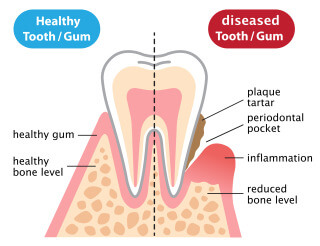Periodontitis (gum disease) is an infection and results in the destruction of the tissues that hold your teeth in place. It's typically caused by poor brushing and flossing habits that allow plaque, a sticky film of bacteria, to build up on the teeth and harden, though genetics may also play a significant role in the disease process. In advanced stages, periodontal disease can lead to sore, bleeding gums, painful chewing problems, and eventually tooth loss.

Our mouths are full of bacteria. These bacteria, along with mucus and other particles, constantly form a sticky, colorless plaque on teeth. Brushing and flossing help get rid of this plaque. Plaque that is not removed can harden and form calculus (tartar) that brushing doesn’t clean. Only a professional cleaning by a dentist or dental hygienist can remove tartar.
There are a number of contributing factors for gum disease, but smoking is the most significant. Smoking also can make treatment for gum disease less successful. Other contributing factors include uncontrolled diabetes, hormonal changes in females, medications that reduce the flow of saliva and certain illnesses.
At a dental visit, a dentist or dental hygienist will:
You can keep your gums and teeth healthy by: